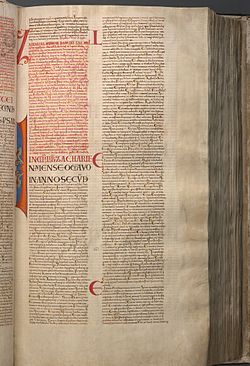| Zechariah 5 | |
|---|---|
 The beginning part of the Book of Zechariah (1:1-6:15) in Latin in Codex Gigas, made around 13th century. | |
| Book | Book of Zechariah |
| Category | Nevi'im |
| Christian Bible part | Old Testament |
| Order in the Christian part | 38 |
Zechariah 5 is the fifth of the 14 chapters in the Book of Zechariah in the Hebrew Bible or the Old Testament of the Christian Bible. [1] [2] [3] This book contains the prophecies attributed to the prophet Zechariah. In the Hebrew Bible it forms a part of the Book of the Twelve Minor Prophets. [4] This chapter records the sixth and seventh of the eight visions of Zechariah, the flying scroll and the woman in a basket, [5] which are compiled in a section (so-called "First Zechariah") consisting of Zechariah 1–8. [6]
